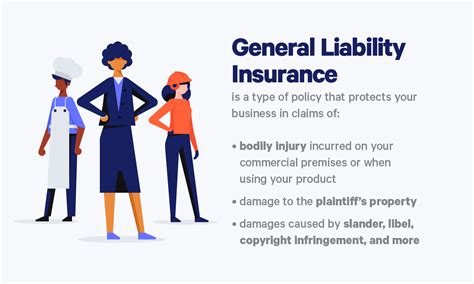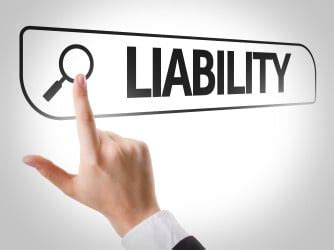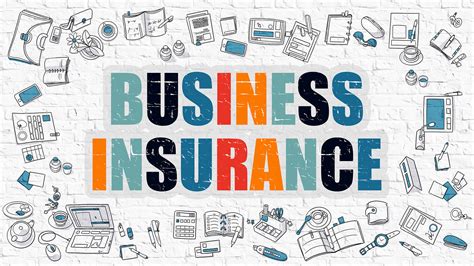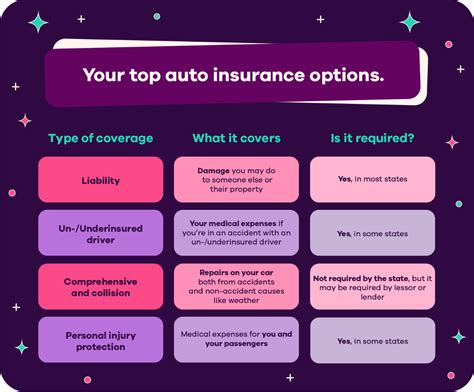Liability Insurance Coverage For Small Business

For small business owners, understanding and securing the right liability insurance coverage is crucial to protect their ventures and ensure long-term sustainability. This comprehensive guide delves into the intricacies of liability insurance, offering expert insights to help small businesses navigate this essential aspect of risk management.
Understanding Liability Insurance

Liability insurance is a cornerstone of business protection, safeguarding against financial losses resulting from claims or lawsuits stemming from alleged negligence or harm caused by the business’s products, services, or operations. For small businesses, this coverage is pivotal in managing unforeseen risks and potential legal liabilities.
This type of insurance is designed to provide a safety net for businesses, covering a range of potential issues such as bodily injury, property damage, personal and advertising injury, and other liability risks. It's an essential component of a robust risk management strategy, ensuring that small businesses can weather the unexpected without significant financial strain.
Key Components of Liability Insurance
- Bodily Injury and Property Damage Liability: Covers injuries or damage caused by the business’s operations, including slips and falls on business premises or injuries caused by defective products.
- Personal and Advertising Injury Liability: Protects against claims of defamation, copyright infringement, or other similar offenses committed through advertising or business activities.
- Medical Payments: Provides coverage for medical expenses incurred by third parties injured on the business’s premises, regardless of fault.
- Products and Completed Operations Liability: Insures against claims arising from products sold or services provided by the business, even after they have been delivered or completed.
Why Small Businesses Need Liability Insurance

Small businesses, despite their size, face a multitude of potential liabilities. From accidents on their premises to lawsuits stemming from product defects, the risks are varied and can be financially devastating without adequate insurance.
For instance, consider a small bakery. While it might seem like a simple business, there are numerous potential hazards. A customer could slip and fall, an employee could be injured while operating equipment, or a disgruntled customer might allege that a product caused an allergic reaction. In each of these scenarios, liability insurance would provide crucial financial protection, covering medical expenses, legal fees, and potential settlement costs.
Moreover, liability insurance can also help protect a business's reputation. In the event of a claim or lawsuit, having robust insurance coverage can demonstrate to stakeholders, customers, and the public that the business is responsible and prepared for unforeseen events. This can be critical for maintaining trust and goodwill, especially in the face of adversity.
Benefits of Comprehensive Liability Insurance
- Financial Protection: Provides a financial safety net, covering costs associated with legal defense, settlements, and judgments.
- Risk Management: Helps identify and mitigate potential risks, allowing businesses to operate with greater confidence.
- Reputation Protection: Demonstrates a commitment to safety and responsibility, helping maintain a positive public image.
- Peace of Mind: Allows business owners to focus on growth and operations, knowing they’re protected against potential liabilities.
Tailoring Coverage to Your Business
Every small business is unique, and as such, their liability insurance needs will vary. It’s essential to work with an insurance professional to assess your specific risks and tailor your coverage accordingly. This process involves a thorough evaluation of your business operations, potential hazards, and the level of coverage required to protect your assets and future growth.
For instance, a small technology startup might primarily need coverage for professional liability or errors and omissions, protecting against claims arising from their services or advice. On the other hand, a retail store might prioritize product liability and premises liability coverage, given the potential risks associated with customers on their premises and the products they sell.
Customizing Your Liability Insurance
- Business Operations Assessment: Understand your specific risks based on your industry, location, and unique business practices.
- Coverage Limits: Determine the appropriate level of coverage to protect your assets and ensure you’re not underinsured.
- Policy Endorsements: Add specific endorsements to your policy to address unique risks, such as cyber liability or employment practices liability.
- Renewal and Review: Regularly review your coverage to ensure it remains adequate as your business grows and evolves.
The Cost of Liability Insurance
The cost of liability insurance is influenced by a variety of factors, including the type of business, its size, the industry it operates in, and the level of coverage required. Generally, the more comprehensive the coverage, the higher the premium. However, it’s important to strike a balance between cost and adequate protection, ensuring your business is sufficiently insured without unnecessary financial strain.
For instance, a small consulting firm might expect to pay a premium based on their annual revenue and the nature of their work. A higher premium might be warranted if the firm provides services in a high-risk industry or has had previous claims, as these factors increase the likelihood of future claims. Conversely, a business with a strong risk management program and a proven track record of low claims might enjoy more competitive rates.
Factors Influencing Liability Insurance Premiums
- Industry Risk: High-risk industries (e.g., construction, manufacturing) often incur higher premiums.
- Claim History: Businesses with a history of frequent or large claims may face higher premiums.
- Coverage Limits: Higher limits of liability typically result in higher premiums.
- Risk Management Practices: Businesses with robust risk management programs may qualify for lower rates.
Conclusion: Securing Your Small Business’s Future

Liability insurance is a critical component of any small business’s risk management strategy. By understanding the types of coverage available and tailoring them to your specific needs, you can protect your business from financial ruin and ensure its long-term viability. It’s an investment in your business’s future, providing the stability and security needed to focus on growth and success.
Expert Takeaway
As a small business owner, it’s imperative to recognize the value of liability insurance. While it might seem like an additional cost, it’s an essential investment that can safeguard your business’s assets, reputation, and future prospects. By partnering with a knowledgeable insurance professional, you can ensure that your coverage is comprehensive, cost-effective, and tailored to your unique business needs.
Frequently Asked Questions
What is the difference between general liability and professional liability insurance?
+General liability insurance covers a broad range of risks, including bodily injury, property damage, and personal injury, whereas professional liability insurance, also known as errors and omissions insurance, specifically covers claims arising from the services or advice provided by professionals. General liability is more broad-based and applicable to a wider range of businesses, while professional liability is tailored to protect professionals against claims of negligence, errors, or omissions in their work.
Can liability insurance cover claims related to COVID-19?
+The coverage for COVID-19-related claims can vary depending on the specific policy and the circumstances of the claim. Some liability policies may provide coverage for bodily injury or property damage claims arising from COVID-19, while others may exclude such claims. It’s important to review your policy carefully or consult with your insurance provider to understand your coverage in relation to COVID-19.
How often should I review my liability insurance coverage?
+It’s recommended to review your liability insurance coverage annually, or whenever your business undergoes significant changes. This could include changes in operations, growth, new products or services, or even shifts in industry regulations. Regular reviews ensure that your coverage remains adequate and aligned with your evolving business needs.



